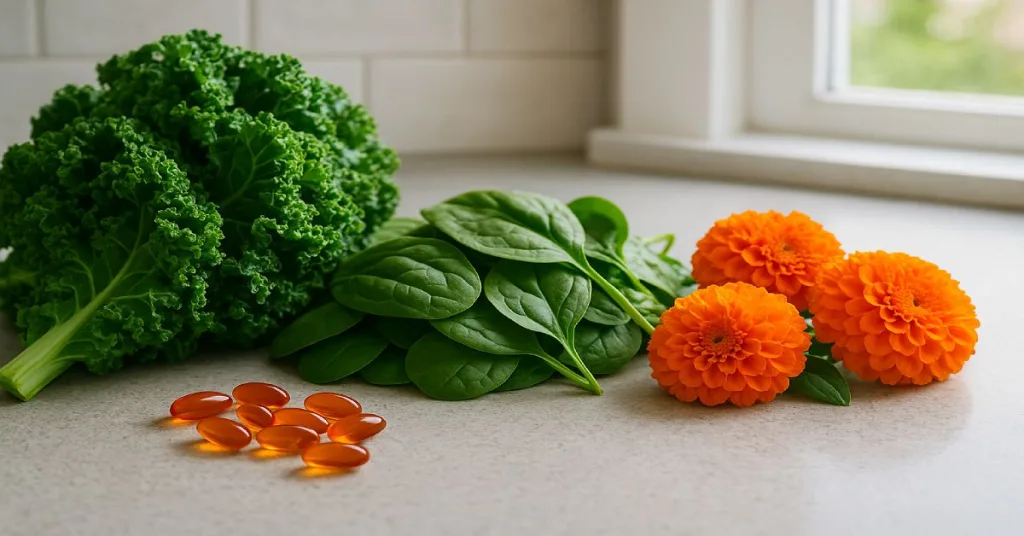If you’ve looked for supplements to protect your eyes from blue light or macular degeneration, you’ve probably seen EyePromise Zeaxanthin + Lutein everywhere. It promises clearer vision, less glare, and better long-term eye health — all from two plant pigments you can technically get from a salad.
So is EyePromise really worth the price, or is it just clever branding on nutrients you could buy cheaper elsewhere? Let’s dig into the science, the dosage, and the value behind one of the most talked-about eye health supplements on the market.
This post may contain affiliate links. If you buy through them, we may earn a small commission at no extra cost to you. We only recommend products backed by science and transparency.
Why Eye Health Supplements Are Everywhere
Screen time, aging, and diet all take a toll on vision. Blue-light strain is real, and age-related macular degeneration (AMD) remains the leading cause of vision loss in older adults.
That’s why the market is flooded with “eye vitamins” that promise to “protect the macula” or “filter blue light.” But only a few ingredients have real scientific backing — and two of the most proven are lutein and zeaxanthin.
These carotenoids (plant-based antioxidants) form the yellow pigment in the macula, the part of your retina responsible for sharp central vision. The thicker that pigment, the better your eyes are at filtering harmful light and neutralizing oxidative stress.
That’s the entire foundation of EyePromise’s formula.
(If you haven’t yet, read our related post: Eye Supplements for Macular Degeneration: What Actually Works (and What’s Just Marketing). It covers the science behind macular nutrients in depth.)
What EyePromise Zeaxanthin + Lutein Claims to Do
EyePromise’s formula is simple and focused. Each softgel provides:
- 10 mg Lutein
- 10 mg Zeaxanthin (RR + RS isomers)
That’s it — no zinc, no vitamin E, no unnecessary filler nutrients. The goal is to deliver the same ratio of carotenoids naturally found in the human macula in a highly absorbable form.
The company highlights three main benefits:
- Supports macular health and visual performance
- Protects against blue-light damage from screens
- Enhances color contrast and night vision
The softgels are vegetarian, gluten-free, and NSF Certified for Sport, which verifies label accuracy and purity — a rare certification in the supplement world.

Ingredient Deep Dive: Lutein and Zeaxanthin
Lutein
Lutein is a yellow pigment found in kale, spinach, and eggs. It concentrates in the retina and helps filter high-energy blue light before it can damage photoreceptor cells.
It also neutralizes free radicals — unstable molecules produced by sunlight exposure and oxidative stress.
Higher lutein intake is strongly linked to better macular pigment density (MPOD), meaning a thicker protective layer against light damage.
Zeaxanthin
Zeaxanthin is lutein’s close cousin. It’s more concentrated in the fovea, the center of your macula — where your sharpest vision comes from.
It’s an even stronger blue-light filter and works synergistically with lutein to maintain retinal clarity and visual comfort.
The Synergy
Your body can’t efficiently convert lutein into zeaxanthin.
That’s why research-backed formulas — including EyePromise — use both together.
The 10 mg + 10 mg ratio directly mirrors what’s been shown to increase macular pigment density in clinical trials.
What the Science Actually Says
The AREDS2 trial, the largest macular health study ever run, showed that adding lutein and zeaxanthin to an antioxidant base significantly reduced the risk of AMD progression in older adults.
Further studies show these carotenoids:
- Increase macular pigment optical density (MPOD)
- Improve glare recovery and contrast sensitivity
- Support night vision and visual performance under bright light
- Help reduce eye strain in people exposed to screens all day
In short, they don’t improve your eyesight like a “quick fix.”
They strengthen the structures that keep your vision resilient as you age — especially under oxidative stress and blue light exposure.
EyePromise’s dosage matches the levels used in these successful studies.
Real-World Performance and What to Expect
Most users won’t notice an immediate difference — and that’s normal. EyePromise works gradually by rebuilding and protecting macular pigment.
- 4–6 weeks: Some users notice reduced glare sensitivity or less strain after long hours on computers.
- 8–12 weeks: Measurable increases in macular pigment density can occur, improving contrast and clarity.
- 3–6 months: Long-term users often report better night vision and less discomfort in bright environments.
For optimal absorption, take each capsule with a meal containing healthy fats — olive oil, eggs, or avocado. Carotenoids are fat-soluble, and fat intake makes a big difference in how well they’re used by the body.
Buying Lutein and Zeaxanthin Separately: Cheaper or Riskier?
Here’s where EyePromise either wins or loses, depending on your priorities.
The DIY Route (Real Products, Real Prices)
- NOW Foods Lutein 20 mg (90 veg caps) — typically $13–$17
- NOW Foods Lutein & Zeaxanthin 25 mg / 5 mg (60 softgels) — around $18–$22
- Life Extension MacuGuard® Ocular Support with Saffron (60 softgels) — around $12–$14, includes lutein, zeaxanthin, meso-zeaxanthin, and saffron
You can approximate EyePromise’s actives using the NOW combo or MacuGuard — both legitimate, well-reviewed products.
But note: the ratios differ (EyePromise is 10/10 mg; others are often 20/4 or 25/5). That’s important because most peer-reviewed research uses a balanced 1:1 ratio.
Lower-cost brands also skip NSF or USP certifications, and absorption can vary due to differences in oil carriers and capsule materials.
The EyePromise Advantage
EyePromise provides:
- The exact 10 mg + 10 mg ratio used in many studies
- NSF certification for purity and label accuracy
- Vegetarian softgels with a lipid base for efficient absorption
Yes, it’s more expensive — roughly $38–$42 for a 2-month supply — but it’s standardized, third-party tested, and dosed precisely for macular pigment support.
What Works Best Together
Lutein and zeaxanthin are the heavy lifters, but they perform better with certain co-nutrients:
- Vitamin E: Protects carotenoids from oxidation during absorption
- Zinc and Copper: Support retinal enzyme activity (included in AREDS2)
- Omega-3s (DHA/EPA): Improve retinal blood flow and reduce dryness
EyePromise focuses narrowly on carotenoids, which makes it clean and specific.
If you’re not already getting those supporting nutrients, pairing this with a solid multivitamin or AREDS2 formula can provide a more complete approach — just don’t double-dose lutein or zeaxanthin.
Quality, Purity, and Safety
EyePromise’s biggest edge is its NSF Certified for Sport status — meaning it’s been independently tested for label accuracy, heavy metals, and contaminants.
Each batch is made in the USA under GMP standards. The softgels are vegetarian, gluten-free, non-GMO, and use a safe safflower/sunflower oil base for absorption.
Minor excipients like maltitol syrup and carrageenan are used for capsule stability and aren’t problematic for most users.
The result is a clean, tightly focused supplement with verified quality control — not a kitchen-sink formula stuffed with cheap fillers.
Price and Value
- Bottle Size: 60 softgels (2-month supply)
- Typical Price: $38–$42 depending on retailer
- Cost per Day: About $0.65–$0.70
That’s higher than most single-ingredient lutein or combo blends, but you’re paying for consistency, purity, and certification.
EyePromise also offers a 60-day money-back guarantee, which covers the full period it takes to see results.
If you just want carotenoid support and trust your sourcing, DIY blends can save money.
If you want research-matched dosing with third-party verification, EyePromise is one of the best available.

Who Should (and Shouldn’t) Take It
Great Fit
- Adults 40 +
- Anyone with a family history of AMD
- Heavy screen users or gamers
- People who rarely eat leafy greens or eggs
- Those with glare or night-vision difficulties
Not Ideal For
- People already taking a full AREDS2 formula
- Anyone expecting instant changes
- Younger users with carotenoid-rich diets
Final Verdict
EyePromise Zeaxanthin + Lutein is one of the few eye supplements that actually follows the science instead of marketing hype.
The 10 mg + 10 mg ratio matches clinical research, the purity certification is legit, and the formulation is clean and precise.
It’s not a miracle cure — nothing is — but it’s exactly what an eye-health supplement should be: accurate, transparent, and effective over time.
Pros
- Clinically validated 10 mg + 10 mg carotenoid ratio
- NSF-certified and vegetarian
- Noticeable long-term improvement in glare tolerance
- Clean, filler-free formulation
- 60-day money-back guarantee
Cons
- Pricier than standard lutein combos
- No supporting vitamins (E, zinc, copper)
- Gradual results
If you want verified, research-aligned macular support, EyePromise delivers.
For broader vision nutrition coverage, read our guide Eye Supplements for Macular Degeneration: What Actually Works (and What’s Just Marketing) to see how it fits into a full-spectrum plan.